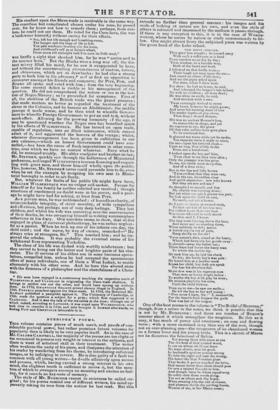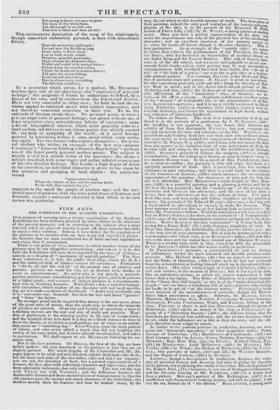BIJRBIDGE . I POEMS.
THIS volume contains pieces of much merit, and proofs of eon- tiderable poetical power, but rather promises future volumes for popularity than is likely to be very popular itself. As in the ease of Mr. CALDER Cam PRE LL, the majority of the poems are too slight or too occasional to possess any weight or interest in the subjects, and there is want of artistical skill in their treatment. The writer often weakens the unity of his piece, and dissipates the attention of his reader by wandering from his theme, by introducing collateral images, or by indulging in reverie. He is also guilty of a fault too common with all young writers—he dwells allusively upon scenes and persons, which, having excited a strong interest in his own mind, the slightest touch is sutlicient to revive it, but the men- tion of which to strangers conveys no meaning and excites no feel- ing, for it sounds no key-note of memory. The style of Mr. BURBIDGE cannot in strictness be called ori- ginal ; for his poems remind one of different writers, his mind ap- parently taking its tone from the author he last read. But this extends no further than general manner : his images and his mode of looking at nature are his own, and even the style of others is coloured and impressed by the medium it passes through. If there is any exception to this, it is in the case of W ORDS- W ORT H, whom he seems by nature or study unconsciously to fol- low. One might almost fancy the subjoined poem was written by the great head of the Lake school.
TIM GIPSY IIEGGAR.
ThPY gave hint nought ; lie turned away With such a sufferance 33 IS bred
Front careless usage day by day; 'Twas wisdom, in a humble way, Both of the heart and head.
I followed on that lordly train—
Their laugh yet rang upon the ear•-■
Just round an elbow hi the laue ;
And me the gipay asked again For alma, when I drew near.
For alms : he hail no hame, he said, And (changed the beggar's tale before) No wife no children ; all were dead ; Ile was alone on earth, he said, And stricken with a sore.
'Twit.; cunningly devised to move My heart, however he might guess; And more his seeming want of love The tender deptha of pity clove, Than deeper ehared distress.
his was ari ancient Roman's face, So statue-like in shape, and yet So viperous in eye, the grace Of that calm outline keen gave place To its continual fret.
It glanced ten times while yet he spoke, Ten separate darts it made or more,
On me—upon his tattered cloak—
Upon an imp, that wildly broke From out a hovel-door.
I looked upon the boy and him, 'Twins clear to me they were akin ; Only the younger was less grim To see, his cheek more dew y-dim, And of a finer skin ; But in the lips and lofty brows 'Twee evident that they were one,
And in the eye, its sudden close
And quick expansion : now who knows But they are sire and son?
So thought Ito myself, and fast 3Iy charity was running down;
But yet when iine quid( glance was peat,
No look upon the child be cast, No smile, nor yet a frown.
So I gave ti i ■knee, as seemed meet, To that sal tale of loveless wo; For coldest heart that ever beat Was never schooled to such deceit As this, said I. I k The imp went dancing down the lane, And never saw us standing there, When suddenly he fell; amain A horrid cry—a cry of pain, Rang shrilly on the air !
'Twas nature's dart, aimed at the heart,.
Which had forsworn her gentle sway : It pierced—away the fattier ran; Three leaps had borne the hasty man To where the urchin lay.
He took him up, he laid his cheek To his; the lovely boy's was pale: Ile kissed him as a mother meek Kisses her child, but doth not speak For fear his shmihers Moist dew was in his viperous eye' That were so horny bright before : To soothe the hoe with play he tries;, He mimics ph fully his cries, Until the child forbore.
Then up to me—he saw me mite—
He led the buy so fair and young : "Five attire I have, Sir :" I, meanwhile, For the heart's faith forgave the guile That was but of the tongue.
One of the best poems in the volume is "Time Bridal of Ravenna though, from a notice in the notes, we think it possible that this is not by Mr. Buituinns ; and there are touches of BvitoN's manner about it which strengthen the suspicion. Be this as it may, it has much of power and sweetness ; an easy and flowing verse ; with a more sustained story than any of the rest, though not an over-pleasing one—the vengeance of an abandoned womaa on a former lover and his young bride. This is a sketch of Marco ere he discovers the falsehood of Sylvia.
Yet among those who roam at eve The thickets of that tainted wood, Ia uric on whom all ill can leave No trace of evil, save for good. In boyhood's Spotless armour strong To love the right and hate the wrong, His heart like that Venetian glass That Irroke if poison touched the brim, Had sooner burst than there should pass Or rest a tainted thought in him. And though 'twos he whose signal-song So softly stole those woods along, Yet not as other. seek thy home, When evening lifts the veil of shame, And pleasure thrills the yielding frame, Woman of sin, is Ser Marco COON;
Hear the answering nightingale!
Far and near the throbbing song Rises, sinks, or floats along ! Low or loud, serene, sedate, Plaintive, peaceful, passionate; Shyly threads the darkened alleys, Walled and roofed with scented leaves; Echoes down the swarded vallies, Climbs the feathered mountain-cleaves; Till upon the waters falling, In its sad and sweet decay, Dies in silence more enthralling The delicious roundelay.
In a postscript which serves for a preface, Mr. BURBIDGE touches upon one of our objections—the " expression of personal feelings ;" the propriety of which he endeavours to defend, by a theory of his own, and by another from the Edinburgh Review. He is not very successful in either case ; for both he and the re- viewer appear to confound moral with critical impropriety, and are therell.re somewhat uncertain in their aim. To us the rationale of the case seems clear. No personal poem, or even a pcsiage exprossive of personal feelings, can please without one of these requisites—very extraordinary felicity of execution ; some ii,trhisie biographical interest, which must generally refer to a dead author, and always to one whose genius has already excited tin" cur:osity or sympathy of the world ; or it must become general by containing within it some moral which every reader can apply. The two former rules explain themselves : the poeti- cal student who wishes an example of the last may examine CAMPBELL'S "Lines on Visiting a Scene in Argyleshire"—perhaps one of the finest purely personal modern poems. The subject is merely a visit to a ruined house of his ancestors; the theme a solitary rose-bud, with some vague and rather inflated expressions of his own desolate feelings. But besides a high degree of finish in the execution, an individual character is given to the scene by the selection and grouping of local objects : the rarely-tra- versed
grass-cover'd road, Where the Molter of deer and the warrior troth!, To his hills that encircle the sea," suggests to the mind the people of another age ; and the inci- dental moral of patience, with the more pointed one of firmness and fortitude, imparts a universal character to that which in its own nat ure was particular. Too young to know, too pure to guess The story of thy wickedness, Yet old enough to see and care That love is sweet and thou art fair !
This enumerative description of the song of the nightingale, though somewhat elaborately pursued, is done with remarkable felicity.



























 Previous page
Previous page